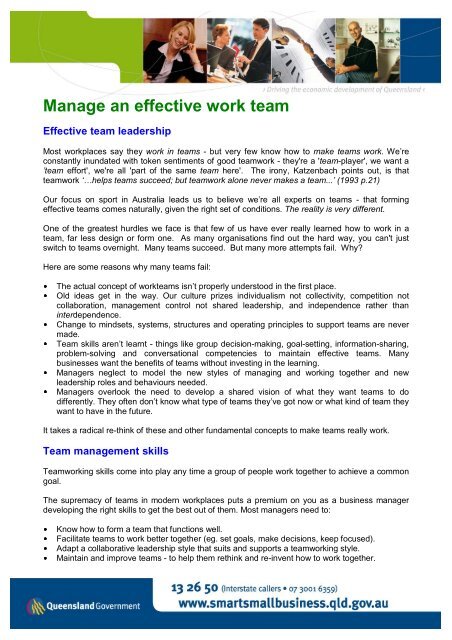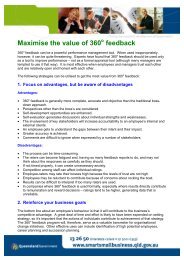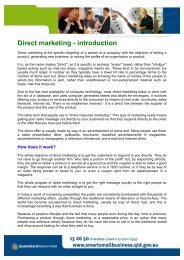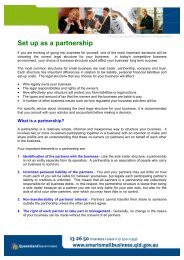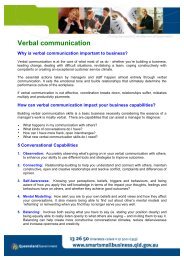Manage An Effective Work Team (PDF â 129kb) - AJML Group
Manage An Effective Work Team (PDF â 129kb) - AJML Group
Manage An Effective Work Team (PDF â 129kb) - AJML Group
Create successful ePaper yourself
Turn your PDF publications into a flip-book with our unique Google optimized e-Paper software.
<strong>Manage</strong> an effective work team<br />
<strong>Effective</strong> team leadership<br />
Most workplaces say they work in teams - but very few know how to make teams work. We’re<br />
constantly inundated with token sentiments of good teamwork - they're a 'team-player', we want a<br />
’team effort', we're all 'part of the same team here'. The irony, Katzenbach points out, is that<br />
teamwork ‘…helps teams succeed; but teamwork alone never makes a team...’ (1993 p.21)<br />
Our focus on sport in Australia leads us to believe we’re all experts on teams - that forming<br />
effective teams comes naturally, given the right set of conditions. The reality is very different.<br />
One of the greatest hurdles we face is that few of us have ever really learned how to work in a<br />
team, far less design or form one. As many organisations find out the hard way, you can't just<br />
switch to teams overnight. Many teams succeed. But many more attempts fail. Why<br />
Here are some reasons why many teams fail:<br />
y<br />
y<br />
y<br />
y<br />
y<br />
y<br />
The actual concept of workteams isn’t properly understood in the first place.<br />
Old ideas get in the way. Our culture prizes individualism not collectivity, competition not<br />
collaboration, management control not shared leadership, and independence rather than<br />
interdependence.<br />
Change to mindsets, systems, structures and operating principles to support teams are never<br />
made.<br />
<strong>Team</strong> skills aren’t learnt - things like group decision-making, goal-setting, information-sharing,<br />
problem-solving and conversational competencies to maintain effective teams. Many<br />
businesses want the benefits of teams without investing in the learning.<br />
<strong>Manage</strong>rs neglect to model the new styles of managing and working together and new<br />
leadership roles and behaviours needed.<br />
<strong>Manage</strong>rs overlook the need to develop a shared vision of what they want teams to do<br />
differently. They often don’t know what type of teams they’ve got now or what kind of team they<br />
want to have in the future.<br />
It takes a radical re-think of these and other fundamental concepts to make teams really work.<br />
<strong>Team</strong> management skills<br />
<strong>Team</strong>working skills come into play any time a group of people work together to achieve a common<br />
goal.<br />
The supremacy of teams in modern workplaces puts a premium on you as a business manager<br />
developing the right skills to get the best out of them. Most managers need to:<br />
y<br />
y<br />
y<br />
y<br />
Know how to form a team that functions well.<br />
Facilitate teams to work better together (eg. set goals, make decisions, keep focused).<br />
Adapt a collaborative leadership style that suits and supports a teamworking style.<br />
Maintain and improve teams - to help them rethink and re-invent how to work together.
You also need to know how to help new or existing workgroups make the transition to teams that<br />
are high-performing, broadly-skilled and self-managing - taking them through the key steps, issues<br />
and choices that are critical to forming and sustaining successful teams that can become more<br />
self-directing over time.<br />
Finally you’ll need to find ways to re-skill your team once it’s formed. When you do, remember to<br />
emphasise team and self-management skills just as much as any new technical, task-specific<br />
ones. To be effective, your team needs a range of new team-based skills in addition to workspecific<br />
skills - for example:<br />
y<br />
y<br />
y<br />
y<br />
y<br />
y<br />
<strong>Team</strong> Communication Skills: Interpersonal and group communication skills to conduct<br />
effective team meetings, discussions and other team interactions.<br />
<strong>Team</strong> Facilitation Skills: Common group facilitation tools and techniques to engage<br />
constructively in team interactions and enhance how teams work together.<br />
<strong>Team</strong>work-Based Design Skills: To apply tools to continuously re-evaluate, redesign and<br />
renew the team’s approach to work.<br />
<strong>Team</strong> <strong>Manage</strong>ment Skills: To tackle new responsibilities for coordinating/managing work<br />
systems/procedures (eg. planning, scheduling, work allocation).<br />
<strong>Team</strong>-Maintenance Skills: To use effective patterns of personal/group behaviour to identify<br />
and correct teamworking problems and maintain good team relationships.<br />
<strong>Team</strong> Formation Skills: To be able to apply principles/concepts for how to form self-directed<br />
teams and work through various stages and steps in team formation.<br />
<strong>Team</strong>-based work is now part of every business leader’s landscape. As well as providing<br />
environments that encourage people to make suggestions, think creatively and innovate,<br />
workteams are a continuous improvement tool. They’re a vehicle for tapping a broader range of<br />
knowledge, expertise, innovation and initiative that can widen your viewpoint about what can be<br />
done differently and better in your business.<br />
Further information<br />
The following fact sheets provide further information on these issues:<br />
• <strong>Effective</strong> work teams<br />
• Help groups make decisions<br />
• Set achievable goals


